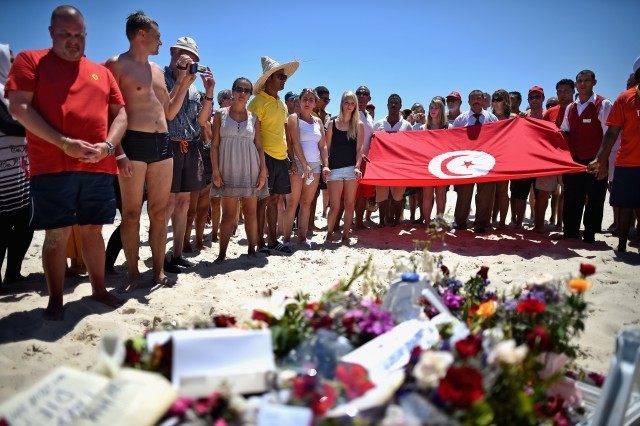The Tunisian government has reportedly announced that it will close down political parties and associations promoting radical Islam, including a mosque where a gunman who recently killed at least 38 people at a Tunisian beach resort is believed to have been radicalized, reports The Sydney Morning Herald.
Families, troubled by long-term unemployment and devastating poverty, are struggling to keep their sons away from a radical mosque in Hay Ettadhem, a poor working neighborhood in the Tunisian capital Tunis, notes The Herald, which is published by Fairfax Media
Extremist mosques have reportedly been allowed to flourish in similar neighborhoods since President Zine El Abidine Ben Ali was overthrown in 2011.
“It was at one of these unlicensed mosques in the city of Kairouan that the Islamic State-inspired gunman Seifeddine Rezgui is believed to have been exposed to the radical teachings that fueled Friday’s devastating attack on one of Tunisia’s best-known beach resorts,” reports The Herald.
“Operating outside state control, an estimated 80 mosques have been slated for closure as the Tunisian Government struggles to respond to the worst ever terror attack on its soil,” it adds.
At least 38 people were killed in the June 26 attack, the majority of them tourists from Britain. Among the dead were also tourists from Ireland, Germany, and Belgium, as well as Tunisians.
Rezgui, armed with a Kalashnikov and grenades, carried out the lone wolf attack, targeting sunbathers in Sousse, a beach resort south of the capital.
Shortly after he was released by police, the father of the 23-year-old gunman, Hakim Rezgui, spoke to ITV News about what his son had done, saying, “I’m so ashamed.”
“I could not comprehend it,” he also said, adding, “I am so shocked, I have no idea who influenced him, or who put these ideas in his head.”
The Sydney Morning Herald reports that the lone gunman was radicalized at one of the mosques that are expected to be closed by the Tunisian government.
“In an attempt to silence the extremist imams and stabilize the country’s fragile security situation, Prime Minister Habib Essid announced on Sunday that political parties and associations promoting radical teachings, including those with suspicious funding sources, would be closed down,” reveals the article.
Hay Ettadhamen resident Taher, a 69-year-old who asked Fairfax Media not to use his last name for fear of reprisals, said that Salafist groups at the mosques use their funding to attract people, many of whom are unemployed.
“They say to people’s sons: ‘we will give you a job’ and they give them a fruit stall or something like that, and then they brainwash them with their teachings,” he explained.
“We are worried about these mosques – it is difficult for some families to control their sons,” added Taher.
On March 18, at least 22 people, mostly foreign tourists, were killed in a terrorist attack at the National Bardo Museum in Tunis.
The Islamic State (ISIS/ISIL) has claimed responsibility for the recent terrorist attack and the one in March.
“Terrorism experts estimate that at least 3000 Tunisians have gone to fight in Libya, Iraq and Syria, leaving Tunisia with the unenviable distinction of providing more foreign fighters to the Islamic State than any other country in the world,” notes The Herald.
Some Tunisians fear that closing down mosques will only worsen Tunisia’s vulnerability to more violence.
“There are 20,000 mosques in Tunis and only 80 of them are not government-controlled… if they intensify the crackdown there will only be more terrorist attacks,” warned Abderraouf Saadouni, a 50-year-old school teacher who was worshipping at a mosque in Tunis, The Herald reports.
“I socialise with young people who come to this mosque and their main problems are unemployment and marginalisation – that is what gives them dark ideas, they develop an anger against the state, they take information from the internet that radicalises them,” he added.

COMMENTS
Please let us know if you're having issues with commenting.